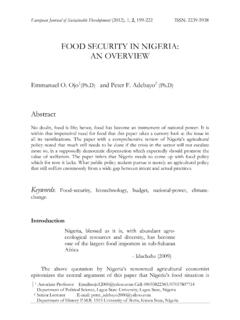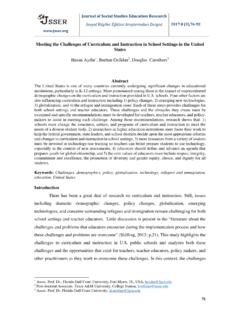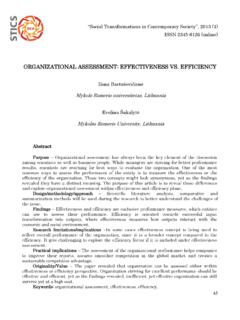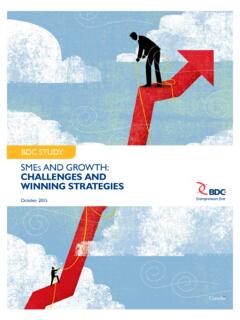Transcription of Issues, Challenges and Prospects of Small and Medium Scale ...
1 European Journal of Sustainable Development (2014), 3, 1, 101-114 ISSN: 2239-5938 Doi: | 1 Department of Business Administration, Niger Delta University, Wilberforce Island, Bayelsa State, PMB 071, Yenegoa, Bayelsa State, Nigeria. Issues, Challenges and Prospects of Small and Medium Scale Enterprises (SMEs) in Port-Harcourt City, Nigeria By 1Dr. Mba Okechukwu Agwu and 1Dr. Cletus Izunwanne Emeti Abstract The paper discussed Issues, Challenges and Prospects of Small and Medium Scale Enterprises (SMEs) in Port-HarcourtCity, Nigeria. This was informed by the high rate of unemployment in the society and the poor performance of SMEs in employment generation. While the research questions addressed the extent to which poor financing, inadequate social infrastructures, lack of managerial skills and multiple taxation constitute major Challenges in the performance of SMEs between October 2012 and November 2013, it assumes that government intervention through the provision of financial assistance, social infrastructures and favorable taxation policies will reverse the trend.
2 The paper adopted a descriptive research design using 120 randomly selected registered operators of SMEs in Port-Harcourt City. Data collected were analyzed using descriptive statistics while formulated hypotheses were tested using z-test. Results from the data analysis indicated that poor financing, inadequate social infrastructures, lack of managerial skills and multiple taxation were major Challenges confronting SMEs in Port-Harcourt City, thus recommended:provision of soft loans to SMEs operators, government guaranteeing of long-term loans to SMEs operators, establishment of SMEs funding agency, public/private sector partnership in infrastructural provision, capacity building for SMEs operators and provision of tax incentives for SMEs operators. Keywords: Small and Medium Scale Enterprises, SME operators, Port-Harcourt City, Nigeria.
3 1. Introduction Small and Medium Scale enterprises (SMEs) are generally regarded as the engine of economic growth and equitable development in developing economies. They are labour intensive, capital saving and capable of helping create most of the one billion new jobs the world will need by the end of the century [1]. They are also perceived as the key to Nigeria s economic growth, poverty alleviation and employment generation. But their 102 European Journal of Sustainable Development (2014), 3, 1, 101-114 Published by ECSDEV, Via deiFiori, 34, 00172, Rome, Italy unimpressive performance in employment generation in recent years has generated a lot of research interests on their Challenges and Prospects . After Nigeria s independence in 1960, much emphasis has been laid on the growth of Small and Medium Scale industries as a means of reducing the incidence of poverty and unemployment in the country.
4 Since the adoption of the economic reform programme in 1986, there has been a decisive shift from grandiose, capital intensive and large Scale industrial projects based on import substitution to Small Scale industries with immense potentials for developing domestic linkages for sustainable industrial development. Apart from SMEs potential for self-reliant industrialization using local raw materials, they are in a better position to boost employment, guarantee even distribution of industrial development and facilitate the growth of non-oil exports. Fissaeha [2], states that SMEs employ 22% of the adult population in developing countries while Fabayo [3] observed that Small firms are major source of employment opportunities for a wide cross-section of the workforce: the young, old part-time workers and the cyclically unemployed.
5 Kombo, etal [4], submitted that SMEs have contributed greatly to the growth of Kenyan economy, accounting for 12-14% of GDP, through creating employment opportunities, training entrepreneurs, generating income and providing a source of livelihood for the majority of low income households in the country . Hence, promotion of such enterprises in developing economies like Nigeria will bring about great distribution of income and wealth, economic self-dependence, entrepreneurial development and a host of other positive economic uplifting factors [5]. SMEs are veritable engines for attainment of national objective in terms of employment generation at low investment cost, development of entrepreneurial capabilities and indigenous technology. They reduce the flow of people from rural to urban areas and can easily be established with minimal skill.
6 They also contribute substantially to the country s gross domestic product, export earnings and development of employment opportunities. Most SMEs in Port-Harcourt city operate as family/sole proprietorship business and are generally classified into commercial, industrial and agricultural categories depending on their activities though commercial SMEs constitute more than 90% of the entire number. There are 1,200 registered SMEs in Port-Harcourt city offering various products/services to the general public. Because, SMEs can be established with minimal capital/registration/managerial skill, there are in the most vantage position for employment generation and promotion of entrepreneurial capacity at the local level. Despite the presence of many SMEs in Port-Harcourt city, the high rate of unemployment (28%) in a population of 157,791,115 persons suggests that these SMEs are experiencing some major Challenges that are hindering their performance.
7 It is against this background that it becomes pertinent to discuss the issues, Challenges and Prospects of Small and Medium Scale enterprises (SMEs) in Port-Harcourt City. Statement of the Problem Most SMEs in Nigeria die within their first five years of existence, a smaller percentage goes into extinction between the sixth and tenth year while only about five to ten percent survive, thrive and grow to maturity [6]. Many factors have been identified contributing to this premature death of SMEs. Key among them include: insufficient capital, irregular Agwu and Emeti 103 2014 The Author. Journal Compilation 2014 European Center of Sustainable Development. power supply, infrastructural inadequacies (water, roads etc.), lack of focus, inadequate market research, over-concentration on one or two markets for finished products, lack of succession plan, inexperience, lack of proper book keeping, lack of proper records or lack of any records at all, inability to separate business and family or personal finances, lack of business strategy, inability to distinguish between revenue and profit, inability to procure the right plant and machinery, inability to engage or employ the right caliber of staff, cut-throat competition[7].
8 Beckman [8] contend that most of the problems of SMEs are external to it, among them are those related to capital shortage, taxation and regulations, product liability patent and franchising abuses. The internal problems of SMEs in Nigeria include: inadequate working capital, stiff competition from larger companies, difficulties in sourcing raw materials, low capacity utilization, lack of management strategies, poor educational background of operators, and huge financial problems while the external problems include: policy inconsistencies, multiple taxation, harsh regulatory requirements and trade groups[9]. It is also important to note that SMEs in Port-Harcourt City are not immune from the aforementioned Challenges in their day to day operations hence it becomes necessary to embark on a study that investigates the issues, Challenges and Prospects of Small and Medium Scale enterprises in Port-Harcourt City.
9 Research Objectives The research objectives are as follows: 1. To determine whether poor financing constitute a major challenge in the performance of SMEs in Port-Harcourt City. 2. To ascertain whether inadequate social infrastructures constitute a major challenge in the performance of SMEs in Port-Harcourt City. 3. To determine whether lack of managerial skills constitute a major challenge in the performance of SMEs in Port-Harcourt City. 4. To ascertain whether multiple taxation constitute a major challenge in the performance of SMEs in Port-Harcourt City. Research Questions From the above research objectives, the following research questions were formulated: 1. Does poor financing constitute a major challenge in the performance of SMEs in Port-Harcourt City? 2. Do inadequate social infrastructures constitute a major challenge in the performance of SMEs in Port-Harcourt City?
10 3. Does lack of managerial skills constitute a major challenge in the performance of SMEs in Port-Harcourt City? 4. Does multiple taxation constitute a major challenge in the performance of SMEs in Port-Harcourt City? Research Hypotheses In view of the above research questions, the following null hypotheses were formulated: : Poor financing does not constitute a major challenge in the performance of SMEs in Port-Harcourt City. 104 European Journal of Sustainable Development (2014), 3, 1, 101-114 Published by ECSDEV, Via deiFiori, 34, 00172, Rome, Italy : Inadequate social infrastructures do not constitute a major challenge in the performance of SMEs in Port-Harcourt City. 3HO: Lack of managerial skills does not constitute a major challenge in the performance of SMEs in Port-Harcourt City.










